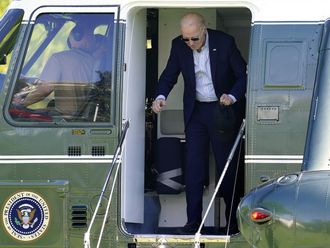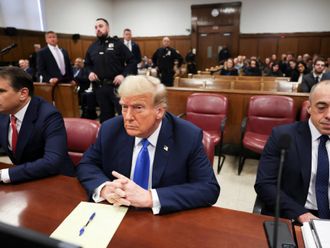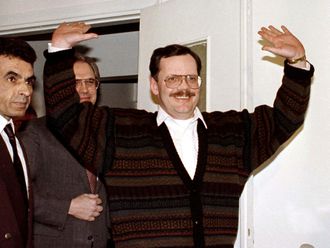New York: Listen to the Republican candidates for president and they’ll tell you the US faces a dire threat from terrorism, and is on the brink of falling victim to Daesh militants.
“I’m afraid some Americans have grown tired of fighting them,” South Carolina Sen. Lindsey Graham said on Monday when kicking off his campaign. “I have bad news to share with you: the radical Islamists are not tired of fighting you.”
Meanwhile, in a Democratic field topped by the former top US diplomat, foreign policy rarely comes up. Instead, Hillary Rodham Clinton and her peers see a nation crippled by economic anxiety, where financial titans grow ever richer and everyday families struggle to keep pace.
“Nobody expects everything to come easy,” Clinton said during a recent campaign event in South Carolina. “But it shouldn’t be quite so hard to get ahead and stay ahead in America.”
As the presidential campaign starts to move past the question of who is and isn’t running for the White House, the two parties find themselves setting out on sharply divergent paths to Election Day. While Clinton visits the early voting states, rarely mentioning her experience as a former secretary of state, her would-be Republican challengers fly to Israel and Poland, eager to gain a foreign policy edge in a crowded primary contest.
“Hillary Clinton is in a complete box on foreign policy,” said Republican National Committee chairman Reince Priebus. “Eventually she’s going to have to talk about what she did and didn’t do abroad to further the position of our country and improve the safety of our people.”
Yet Clinton’s Democratic challengers don’t see it that way. Rather than talk about foreign affairs as a way to criticise Clinton, they’ve joined with her to focus on pocketbook issues. Last week, Senator Bernie Sanders described a “rigged economy” and argued the country’s “grotesque level of inequality is immoral.” Former Maryland governor Martin O’Malley got into the race last weekend with a message to the “bullies of Wall Street” and promises to “to rebuild the truth of the American dream.”
The only Democrat driven by foreign policy is former Rhode Island governor Lincoln Chafee, and even then, his primary concern is Clinton’s vote in favour of the Iraq war in 2002.
So far, Clinton’s campaign has felt little need to stress her international record, though aides are confident that she would beat out a less experienced Republican challenger on the issue. Her advisers argue the failing unemployment rate masks a lingering economic anxiety that’s remains voters core concern. The aides spoke on condition of anonymity, in order to brief reporters on campaign strategy.
Republicans don’t ignore economic issues, but foreign policy has dominated their debate. That’s especially true in recent days, as the Senate considers extending surveillance powers granted to the National Security Agency, prompting the party’s candidates lash out at each other (and Clinton).
Republican senator Rand Paul has aggressively opposed the 9/11-era antiterrorism tools and has used his push to end them as a way to raise money for his presidential campaign. New Jersey governor Chris Christie said Paul and his supporters suffer from 9/11 amnesia, while Wisconsin governor Scott Walker said Monday that Paul’s efforts won’t help him in the Republican primaries.
Beyond their internal divisions over America’s place in the world, the GOP’s candidates are united in linking Clinton to President Barack Obama’s record overseas. They frequently describe the “Obama-Clinton record” on issues such as Syria’s civil war and the rise of the Daesh group.
Former Florida governor Jeb Bush, who plans to tour eastern Europe next month, said Clinton has been “riding shotgun for four years” as part of the Obama administration. “It’s her policies as well. And we will hold her to account,” he said while campaigning recently in Michigan.












